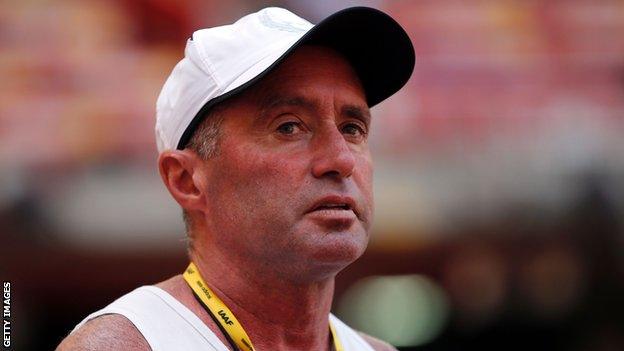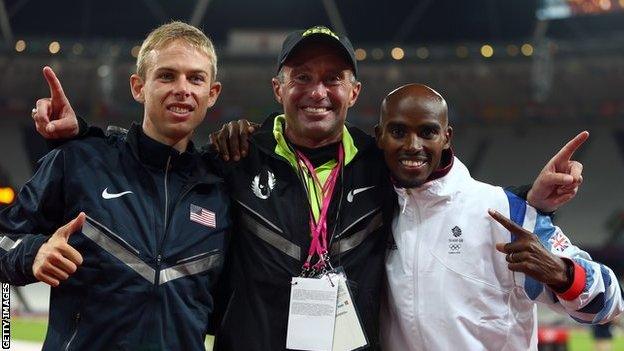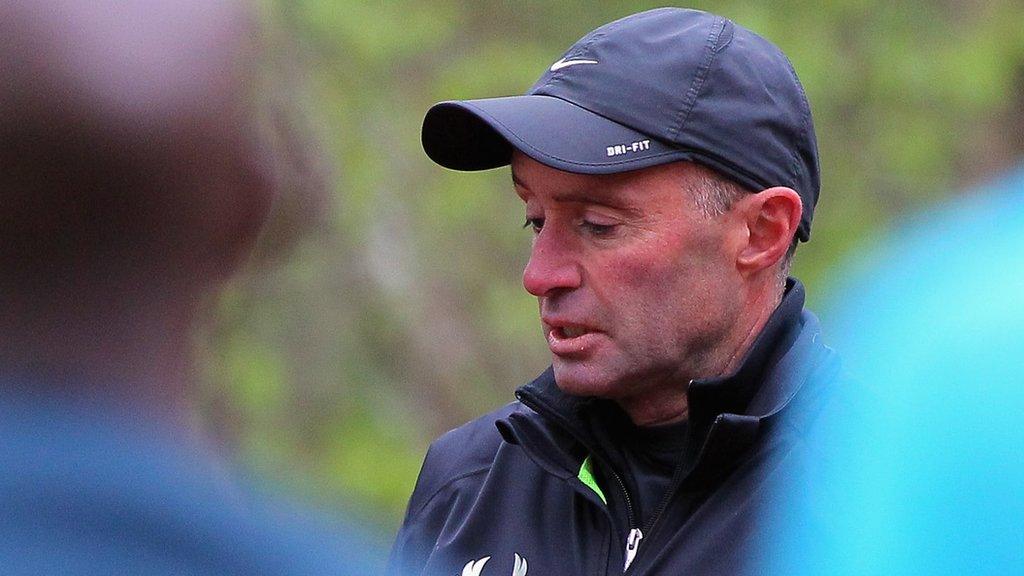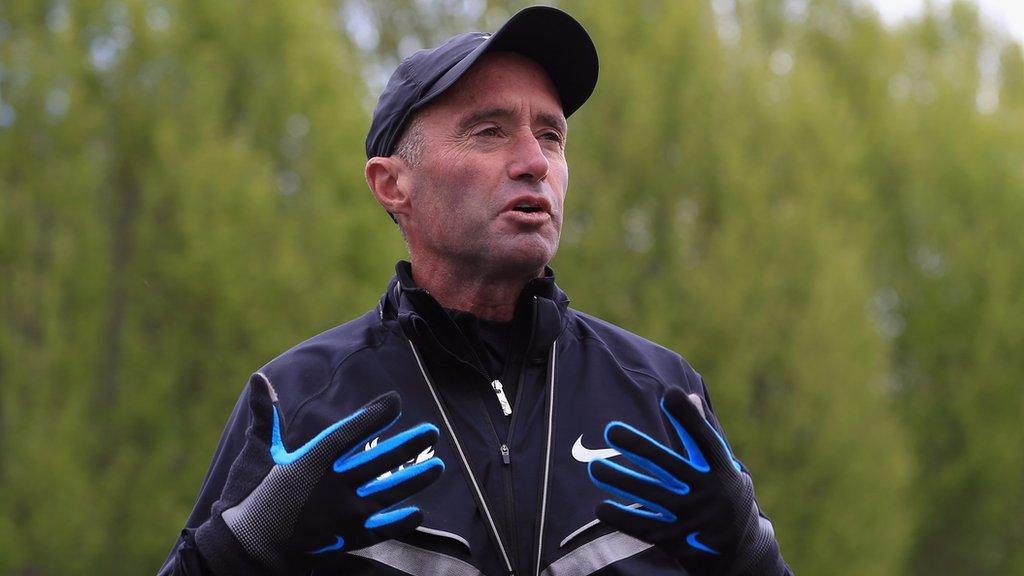Mo Farah: Supplement infusion 'not recorded properly by UK Athletics'
- Published

Alberto Salazar has been under Usada investigation since 2015
UK Athletics staff may not have properly recorded an infusion of a controversial supplement for its star athlete Mo Farah, the BBC has learned.
The infusion of the legal supplement L-carnitine, given to Farah in 2014 before a major race, is being looked at by the US Anti-Doping Agency (Usada) to determine if it broke rules.
The infusion was carried out by UKA medics under instructions from Farah's coach Alberto Salazar, who has been under investigation by Usada and UK Anti-Doping (Ukad) since 2015.
That followed claims of doping and unethical practices made in a BBC Panorama programme.
Both Salazar and Farah have strenuously denied breaking any rules.
Despite having provided "information" to Usada on the infusion, the BBC understands that UKA may not have recorded all data properly.
A UKA spokesperson told the BBC it had fully co-operated with the anti-doping authorities and had provided "information" relating to the infusion, including the amounts, to the doping authorities.
UKA did not directly answer repeated requests from the BBC for detail about whether medical protocols on record-keeping were followed over the infusion, which was given to Farah before his London Marathon debut in 2014.
The BBC understands, however, that staff failed to centrally log key data into the UKA system, and investigators have therefore been unable to establish beyond doubt what the infusion levels were.
Speaking at the Tackling Doping in Sport conference on Wednesday, Ukad chief executive Nicole Sapstead highlighted the importance of "accurate and timely record-keeping".
She said: "It is vitally important that all sports governing bodies keep their medical records up to date for their athletes. It protects your organisation and your athletes."
According to a leaked Usada interim report, passed by the Fancy Bears hacking group to the Sunday Times Insight team, Farah's L-carnitine infusion remains under investigation by Usada to evaluate whether it broke World Anti-Doping Agency (Wada) rules on infusion limits.
A spokesperson for Farah said the infusion was "well below" the 50 millilitre limit permitted under the Wada code.
The Usada report centres on claims a number of athletes at Salazar's Nike Oregon Project were given infusions of the chemical L-carnitine - a naturally occurring amino acid often prescribed as a supplement for heart and muscle disorders.
Although not banned by Wada, infusions of more than 50ml in the space of six hours are prohibited.
The interim report cites evidence that many of the L-carnitine infusions carried out by Salazar on some of his athletes were "almost certainly" more than 50ml and therefore doping violations.
The report revealed Usada was aware of one infusion, involving four-time Olympic gold-medal winner Farah.
It states: "Oregon Project athlete Mo Farah received an L-carnitine infusion from British physician Robin Chakraverty in April 2014."
Salazar had sent instructions by email to Barry Fudge, a UK Athletics physiologist, to assist him in "preparing an L-carnitine infusion for Mo Farah to use prior to Farah's marathon debut, set to occur in the London marathon" on 13 April, 2014.
The Salazar email to Fudge included an infusion protocol used on other, unnamed, NOP athletes.
Usada's investigation revealed its scientists believed that the large increases in L-carnitine levels in several NOP athletes' bodies after infusion would not be possible if the 50ml limit was adhered to.
In Farah's case, according to the report, Usada had not obtained medical evidence of the dosage taken before the race, in which he finished eighth, four minutes behind the winner.
The report adds: "Usada continues to investigate circumstances related to L-carnitine use by Mo Farah."

Salazar (centre) celebrates with Mo Farah and Galen Rupp after the pair took gold and silver in the 10,000m final at the London 2012 Olympics
Responding to the leak last week, UKA said: "To our knowledge, all doses administered and methods of administration have been fully in accordance with Wada-approved protocol and guidelines."
But on Wednesday, UKA declined to deny the allegation that its staff failed to keep adequate medical records.
The spokesperson said that it would not comment on ongoing investigations, but pointed to UKA's internal review of its relationship with Salazar - who remains a UKA consultant - published last year, which made a series of recommendations including: "To ensure there are full and proper recordings of all medical, legal and ethical considerations given prior to the implementation of all athlete performance programmes."
The development comes as British Cycling and Team Sky endure their worst crisis over an alleged failure to keep proper medical records around a mysterious medical package.
A spokesperson for Mo Farah told the BBC: "As a professional athlete, Mo is subject to extensive anti-doping testing at all times by a wide number of different organisations.
"Mo is obviously not responsible or involved in the official record-keeping of these test results, but we can categorically state that he has only had one infusion of L-carnitine during his career, which was back in 2014, was fully administered and overseen by the team at UK Athletics, and was well below the 50ml limit permitted under the Wada code.
"We understand that there are UK Athletics documents which verify this, and that these have been seen by Usada and Ukad.
"As Mo has said previously, he is happy to be tested any time, anywhere, and to have any of his samples tested or retested now or at any time in the future."
Dr Chakraverty declined to comment. The BBC has asked Fudge for comment.
Salazar has always denied breaking any rules, insisting the infusions were within the rules because they were less than 50ml.
He told the BBC last week that any use of L-carnitine was done so within Wada guidelines.
He added: "In this case, to ensure my interpretation of Wada rules was correct, I also communicated in writing with Usada in advance of the use and administration of L-carnitine with Oregon Project athletes. Oregon Project athletes were then administered L-carnitine in exactly the same way Usada directed."
Farah has come under sustained pressure about his association with Salazar, his coach since 2011.
Salazar faces possible sanction from Usada over the infusions but also his possession of the banned anabolic steroid testosterone, first revealed by Panorama in June 2015. Salazar insists he has a valid prescription for the drug.
The leaked interim report states the American has thus far failed to provide "acceptable justification for possessing testosterone" at his NOP running camp.
The 58-year-old claims he is being "persecuted".
- Published3 March 2017

- Published26 February 2017

- Published26 February 2017

- Published8 March 2017
